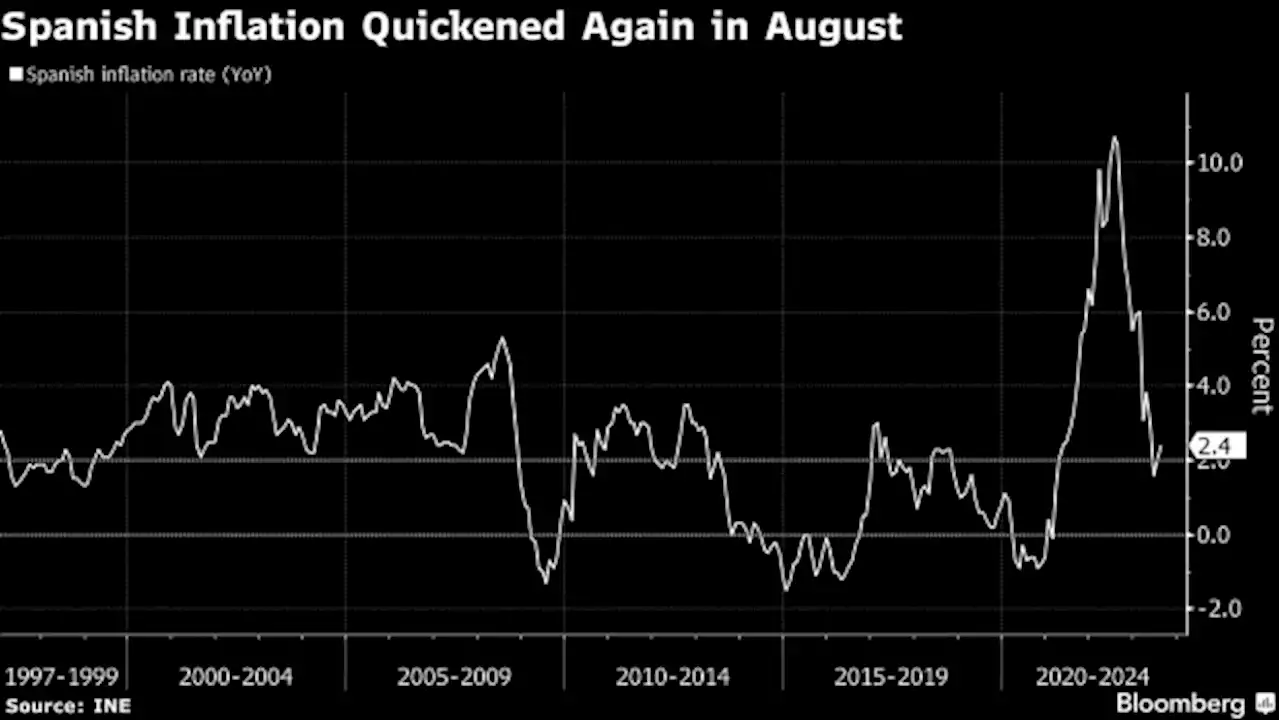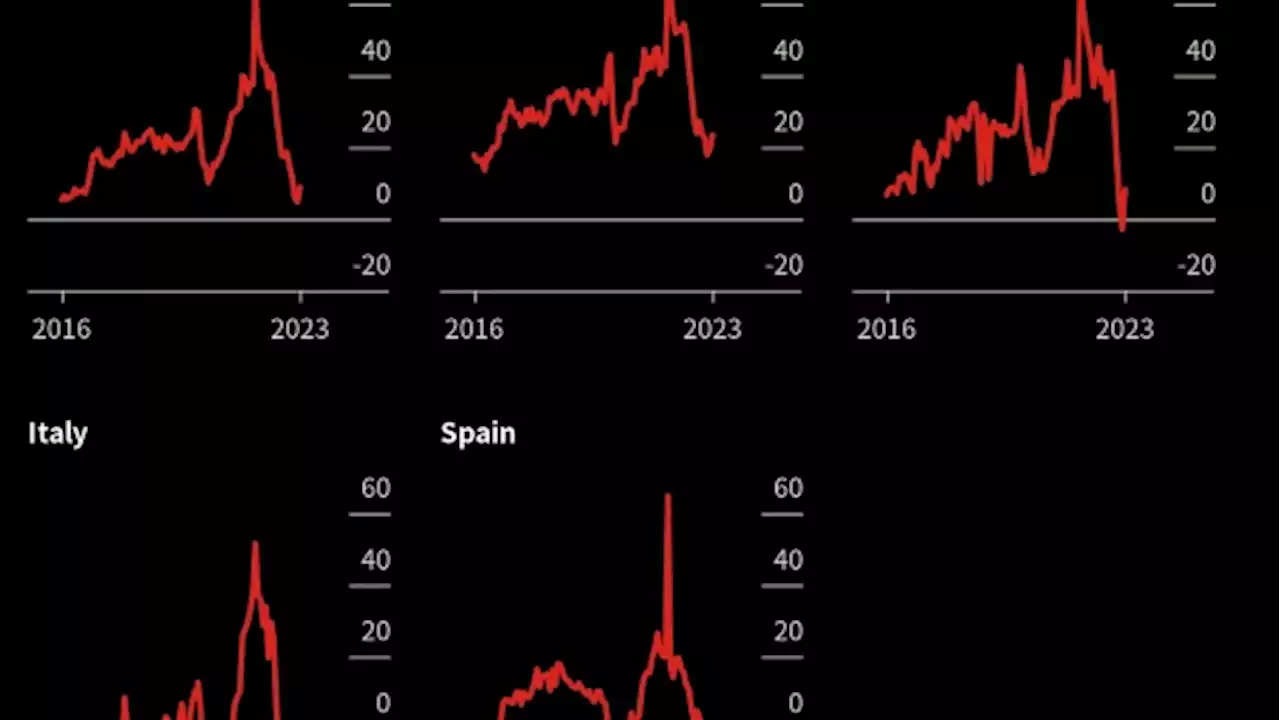The European Central Bank cautioned against reading too much into a bond-market metric often regarded as a harbinger of recession.
The predictive power of an inverted yield curve — typically seen to herald a downturn — has been reduced in recent years by central bank bond buying, the ECB said in its account of its July monetary policy meeting.
The purchases have weighed on the so-called term premium, according to the ECB. That’s the additional yield component that investors typically demand to compensate for the risks of holding longer-dated bonds. For months, those arguing that economies were headed for a recession have pointed to the inverted yield curves in the US and Europe, to support their view. The thinking is that investors flocking to long-dated bonds, and thereby driving rates below short-term tenors, expect borrowing costs in the future to fall as the economy slows.
Germany’s yield curve between the two and 10-year tenors is currently inverted by around 50 basis points, off an early July low that was deepest inversion since 1992. Almost every US recession since 1955 has been preceded by such a curve shape, though by mid-2023, the downturn had failed to materialize. The US Treasury yield curve has been inverted for more than a year.
The ECB acknowledged in its account that an inversion in euro area yields “had reignited recession concerns among market participants,” particularly given the track record for such a move.Still, “owing to the stock effect of the central banks’ bond holdings, the term premium remained compressed, which could reduce the predictive content of the slope of the yield curve for economic growth,” it said.
Canada Latest News, Canada Headlines
Similar News:You can also read news stories similar to this one that we have collected from other news sources.
 Euro-Area Economic Confidence Falls Again as ECB Mulls Next MoveEuro-area economic confidence slowed more than anticipated this month, further overshadowing the region’s outlook.
Euro-Area Economic Confidence Falls Again as ECB Mulls Next MoveEuro-area economic confidence slowed more than anticipated this month, further overshadowing the region’s outlook.
Read more »
 Canaccord analyst sees ‘increasingly appealing dividend yield proposition’ for Canadian banksDaily roundup of research and analysis from The Globe and Mail’s market strategist Scott Barlow is reading today on the Web
Canaccord analyst sees ‘increasingly appealing dividend yield proposition’ for Canadian banksDaily roundup of research and analysis from The Globe and Mail’s market strategist Scott Barlow is reading today on the Web
Read more »
 Spanish Inflation Quickens in First Glimpse of Key Data for ECBSpanish inflation quickened again in the first of a string of reports from around the region that will help European Central Bank officials judge whether to keep raising interest rates.
Spanish Inflation Quickens in First Glimpse of Key Data for ECBSpanish inflation quickened again in the first of a string of reports from around the region that will help European Central Bank officials judge whether to keep raising interest rates.
Read more »
 Stubborn Inflation in Germany and Spain Keeps ECB on Data AlertInflation slowed less than expected in Germany and quickened in Spain, offering European Central Bank officials a partial picture of the region’s price pressures as they judge whether to raise interest rates again.
Stubborn Inflation in Germany and Spain Keeps ECB on Data AlertInflation slowed less than expected in Germany and quickened in Spain, offering European Central Bank officials a partial picture of the region’s price pressures as they judge whether to raise interest rates again.
Read more »
 Italy to Push Cipollone for Unopposed ECB Board Seat After AllBank of Italy Deputy Governor Piero Cipollone will be his country’s nominee for European Central Bank instead of his former colleague Daniele Franco, according to people familiar with the matter.
Italy to Push Cipollone for Unopposed ECB Board Seat After AllBank of Italy Deputy Governor Piero Cipollone will be his country’s nominee for European Central Bank instead of his former colleague Daniele Franco, according to people familiar with the matter.
Read more »
 Italy offers digital euro expert Cipollone for ECB postPiero Cipollone, Italy's choice for the European Central Bank's executive board, has a reputation for discreetly helping Rome's eurosceptic government rub along with EU institutions and brings skills in economics, particularly in digital money, tempered with pragmatism, people who have worked with him say. Cipollone, a three-decade veteran of the Bank of Italy, was the only candidate proposed to replace Fabio Panetta when nominations closed on Wednesday, the head of the Eurogroup of euro zone finance ministers Paschal Donohoe said. Each of the euro zone's three biggest economies - Germany, France and Italy - have traditionally had one representative on the six-member panel, and the Italian seat will fall vacant on Oct. 31 when Panetta moves to head the Italian central bank.
Italy offers digital euro expert Cipollone for ECB postPiero Cipollone, Italy's choice for the European Central Bank's executive board, has a reputation for discreetly helping Rome's eurosceptic government rub along with EU institutions and brings skills in economics, particularly in digital money, tempered with pragmatism, people who have worked with him say. Cipollone, a three-decade veteran of the Bank of Italy, was the only candidate proposed to replace Fabio Panetta when nominations closed on Wednesday, the head of the Eurogroup of euro zone finance ministers Paschal Donohoe said. Each of the euro zone's three biggest economies - Germany, France and Italy - have traditionally had one representative on the six-member panel, and the Italian seat will fall vacant on Oct. 31 when Panetta moves to head the Italian central bank.
Read more »
